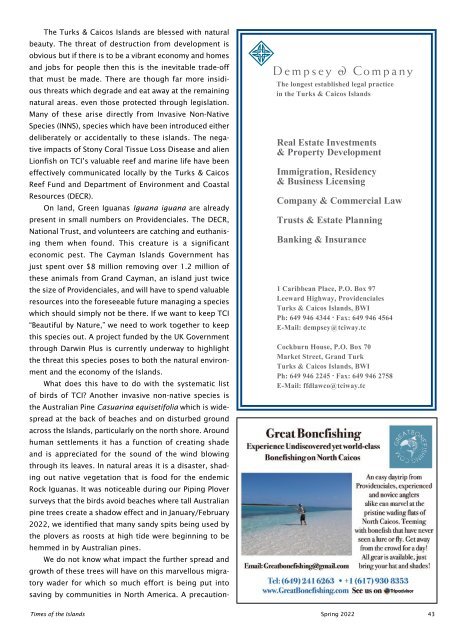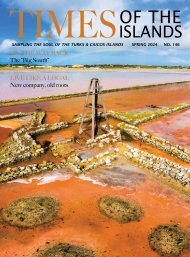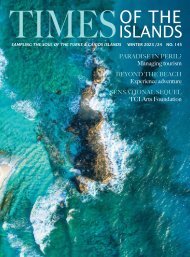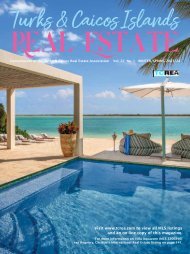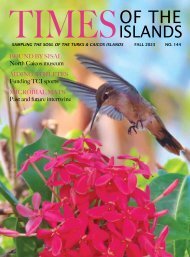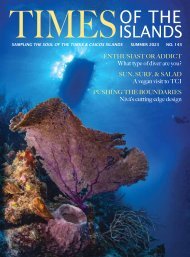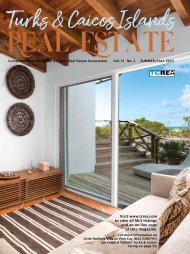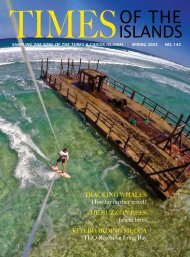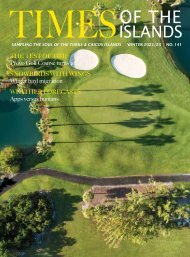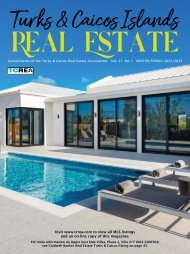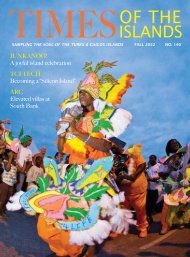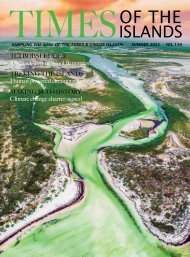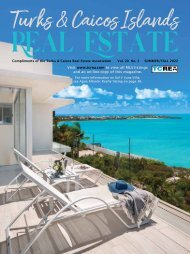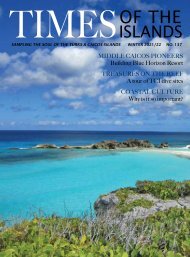Times of the Islands Spring 2022
Presents the "soul of the Turks & Caicos Islands" with in-depth features about local people, culture, history, environment, real estate, businesses, resorts, restaurants and activities.
Presents the "soul of the Turks & Caicos Islands" with in-depth features about local people, culture, history, environment, real estate, businesses, resorts, restaurants and activities.
Create successful ePaper yourself
Turn your PDF publications into a flip-book with our unique Google optimized e-Paper software.
The Turks & Caicos <strong>Islands</strong> are blessed with natural<br />
beauty. The threat <strong>of</strong> destruction from development is<br />
obvious but if <strong>the</strong>re is to be a vibrant economy and homes<br />
and jobs for people <strong>the</strong>n this is <strong>the</strong> inevitable trade-<strong>of</strong>f<br />
that must be made. There are though far more insidious<br />
threats which degrade and eat away at <strong>the</strong> remaining<br />
natural areas. even those protected through legislation.<br />
Many <strong>of</strong> <strong>the</strong>se arise directly from Invasive Non-Native<br />
Species (INNS), species which have been introduced ei<strong>the</strong>r<br />
deliberately or accidentally to <strong>the</strong>se islands. The negative<br />
impacts <strong>of</strong> Stony Coral Tissue Loss Disease and alien<br />
Lionfish on TCI’s valuable reef and marine life have been<br />
effectively communicated locally by <strong>the</strong> Turks & Caicos<br />
Reef Fund and Department <strong>of</strong> Environment and Coastal<br />
Resources (DECR).<br />
On land, Green Iguanas Iguana iguana are already<br />
present in small numbers on Providenciales. The DECR,<br />
National Trust, and volunteers are catching and euthanising<br />
<strong>the</strong>m when found. This creature is a significant<br />
economic pest. The Cayman <strong>Islands</strong> Government has<br />
just spent over $8 million removing over 1.2 million <strong>of</strong><br />
<strong>the</strong>se animals from Grand Cayman, an island just twice<br />
<strong>the</strong> size <strong>of</strong> Providenciales, and will have to spend valuable<br />
resources into <strong>the</strong> foreseeable future managing a species<br />
which should simply not be <strong>the</strong>re. If we want to keep TCI<br />
“Beautiful by Nature,” we need to work toge<strong>the</strong>r to keep<br />
this species out. A project funded by <strong>the</strong> UK Government<br />
through Darwin Plus is currently underway to highlight<br />
<strong>the</strong> threat this species poses to both <strong>the</strong> natural environment<br />
and <strong>the</strong> economy <strong>of</strong> <strong>the</strong> <strong>Islands</strong>.<br />
What does this have to do with <strong>the</strong> systematic list<br />
<strong>of</strong> birds <strong>of</strong> TCI? Ano<strong>the</strong>r invasive non-native species is<br />
<strong>the</strong> Australian Pine Casuarina equisetifolia which is widespread<br />
at <strong>the</strong> back <strong>of</strong> beaches and on disturbed ground<br />
across <strong>the</strong> <strong>Islands</strong>, particularly on <strong>the</strong> north shore. Around<br />
human settlements it has a function <strong>of</strong> creating shade<br />
and is appreciated for <strong>the</strong> sound <strong>of</strong> <strong>the</strong> wind blowing<br />
through its leaves. In natural areas it is a disaster, shading<br />
out native vegetation that is food for <strong>the</strong> endemic<br />
Rock Iguanas. It was noticeable during our Piping Plover<br />
surveys that <strong>the</strong> birds avoid beaches where tall Australian<br />
pine trees create a shadow effect and in January/February<br />
<strong>2022</strong>, we identified that many sandy spits being used by<br />
<strong>the</strong> plovers as roosts at high tide were beginning to be<br />
hemmed in by Australian pines.<br />
We do not know what impact <strong>the</strong> fur<strong>the</strong>r spread and<br />
growth <strong>of</strong> <strong>the</strong>se trees will have on this marvellous migratory<br />
wader for which so much effort is being put into<br />
saving by communities in North America. A precaution-<br />
The longest established legal practice<br />
in <strong>the</strong> Turks & Caicos <strong>Islands</strong><br />
Real Estate Investments<br />
& Property Development<br />
Immigration, Residency<br />
& Business Licensing<br />
Company & Commercial Law<br />
Trusts & Estate Planning<br />
Banking & Insurance<br />
1 Caribbean Place, P.O. Box 97<br />
Leeward Highway, Providenciales<br />
Turks & Caicos <strong>Islands</strong>, BWI<br />
Ph: 649 946 4344 • Fax: 649 946 4564<br />
E-Mail: dempsey@tciway.tc<br />
Cockburn House, P.O. Box 70<br />
Market Street, Grand Turk<br />
Turks & Caicos <strong>Islands</strong>, BWI<br />
Ph: 649 946 2245 • Fax: 649 946 2758<br />
E-Mail: ffdlawco@tciway.tc<br />
<strong>Times</strong> <strong>of</strong> <strong>the</strong> <strong>Islands</strong> <strong>Spring</strong> <strong>2022</strong> 43


